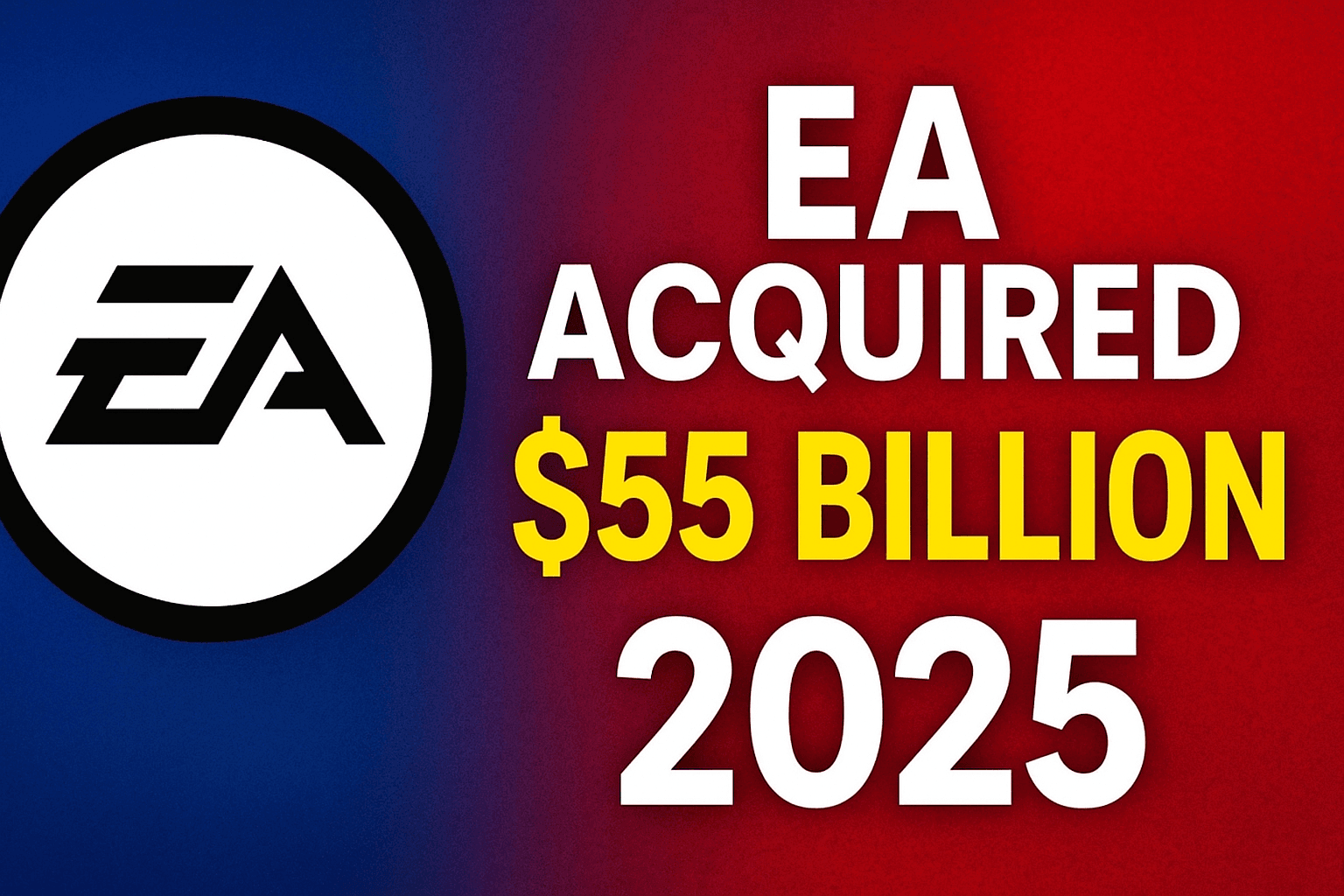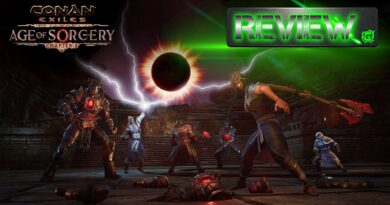Electronic Arts (EA) Acquired for $55 Billion: What the Massive 2025 Deal Means for Gaming’s Future
In a seismic shift for the video game industry, Electronic Arts (EA), the powerhouse behind blockbuster franchises like Madden NFL and The Sims, has agreed to be acquired for a staggering $55 billion, marking the largest leveraged buyout in history.
This deal will take EA private, ending its decades long run as a publicly traded company and ushering in a new era of ownership led by global investors.
If you’re searching for insights on the EA acquisition, or the impact of EA going private on gaming, you’ve come to the right place.
Let’s break down what happened, why it matters and what lies ahead for EA and the broader gaming landscape.
What Happened? A Quick Overview of the EA Acquisition
On September 29, 2025, Electronic Arts announced it has entered into a definitive agreement to be acquired by a consortium of investors for $210 per share in cash, a 25% premium over its closing price just days before.
The transaction values the company at approximately $55 billion and is expected to close in the first quarter of 2027, pending shareholder approval and regulatory clearances.
Who Is Electronic Arts (EA)?
Founded in 1982, Electronic Arts Inc. (EA) is one of the world’s largest video game publishers and developers, headquartered in Redwood City, California.
With a portfolio spanning sports simulations, action adventure epics and life simulation hits, EA has shaped modern gaming for over four decades.
The company went public in 1989 and has been a staple on the NASDAQ (ticker: EA) ever since, until now.
What Was Sold? EA’s Iconic Games and IPs
The deal encompasses EA’s entire operation, including its vast library of intellectual properties (IPs) and studios. Here’s a rundown of some of EA’s most famous games and IPs that make it a gaming titan:
- EA Sports FC (formerly FIFA): The world’s best selling sports series, with over 325 million copies sold globally. Annual releases dominate soccer gaming.
- Madden NFL: The definitive American football franchise, generating billions in revenue and holding exclusive NFL licensing rights.
- The Sims: A cultural phenomenon in life simulation, with The Sims 4 alone amassing over 85 million players since 2014.
- Apex Legends: A free to play battle royale hit that has amassed 130 million players and continues to drive live service revenue.
- Battlefield: Iconic first person shooter series known for massive multiplayer battles, with titles like Battlefield 2042 and the upcoming Batllefield 6 pushing graphical boundaries.
- Other notables: Dragon Age and Mass Effect (RPG masterpieces), Need for Speed (racing thrills), Star Wars Jedi: Survivor (licensed blockbusters), Plants vs Zombies and Dead Space (horror classics).
These IPs aren’t just games, they’re revenue engines.
In fiscal year 2025, EA reported approximately $7.5 billion in net revenue, fueled by digital sales, microtransactions and live services.
The acquisition hands this treasure trove to private hands, potentially reshaping how these franchises evolve.
How Did the EA Sale Come About?
The path to this EA privatization wasn’t overnight.
The gaming industry has been in consolidation mode amid economic headwinds, including rising development costs, layoffs and shifting player preferences toward mobile and live service models.
EA, despite its strengths, faced challenges:
- Lost Licensing Deals: The end of the FIFA partnership in 2022 forced a rebrand to EA Sports FC, though it retained strong sales.
- Stock Pressure: EA’s shares dipped amid broader market volatility and investor scrutiny over growth metrics.
- Strategic Shifts: CEO Andrew Wilson has emphasized live services and acquisitions (like Respawn Entertainment), but public market demands for quarterly results clashed with long term innovation.
Reports of buyout talks surfaced as early as late September 2025, with EA’s board approving the deal after evaluating strategic alternatives.
In essence, going private offers EA freedom from Wall Street’s short term focus, allowing bolder bets on emerging tech like AI driven content and metaverse integrations.
Who Are the Big Players in the EA Deal and Who Led It?
This isn’t a solo act; it’s a powerhouse consortium driving the largest private equity buyout ever.
Here’s the breakdown:
| Player | Role | Key Details |
| Public Investment Fund (PIF) | Lead Investor | Saudi Arabia’s sovereign wealth fund, managing $925 billion in assets. PIF has aggressively entered gaming (e.g., stakes in Activision Blizzard, Nintendo), aiming to diversify beyond oil. |
| Silver Lake | Co-Lead Private Equity Firm | A tech focused PE giant with $102 billion under management. They’ve backed gaming deals like Endeavor’s IMG acquisition and bring expertise in digital media. |
| Affinity Partners | Minority Backer | Jared Kushner’s investment firm, focusing on Middle East ties. This adds geopolitical layers, with Affinity’s involvement signaling U.S.-Saudi collaboration in tech. |
The deal was spearheaded by PIF and Silver Lake, with Affinity providing additional firepower.
What Does the EA Acquisition Mean for EA’s Future?
For EA, going private is a double edged sword. On the upside:
- Long Term Focus: Freed from quarterly earnings pressure, EA can invest heavily in R&D, think next-gen Battlefield engines or expanded The Sims universes without fear of stock dips.
- Studio Autonomy: With 13,000+ employees across 17 studios, private ownership could mean fewer layoffs and more creative risks.
- Global Expansion: PIF’s involvement might accelerate EA’s push into emerging markets like the Middle East and Asia.
However, risks loom: Leveraged buyouts often lead to cost cutting for debt repayment, potentially squeezing budgets for unprofitable IPs like single player titles.
EA’s post deal strategy under Wilson will be pivotal, expect announcements on AI tools and cloud gaming by 2026.
What Does This Mean for the Future of Gaming?
The EA sale 2025 ripples far beyond one company, signaling a privatization wave in gaming.
Here’s why it matters:
- Industry Consolidation Accelerates: With Microsoft owning Activision Blizzard and Sony snapping up Bungie, private equity’s entry (via PIF/Silver Lake) could fund mega mergers, but at the cost of antitrust scrutiny.
- Saudi Influence Grows: PIF’s gaming portfolio now rivals nations’, potentially shifting priorities toward esports hubs in Riyadh over Western narratives.
- Innovation vs. Monetization: Private EA might pioneer VR/AR integrations for Apex Legends, but heavier reliance on microtransactions could alienate core fans.
- Job Market Shifts: While short term stability for EA staff, broader PE trends suggest efficiency drives that could reshape 100,000+ industry jobs.
Ultimately, this deal underscores gaming’s maturation into a trillion dollar behemoth, where private capital fuels growth but demands returns.
What are your thoughts on the Electronic Arts acquisition?
Will it revitalize EA’s IPs or spell trouble for indie devs? Drop a comment below, we’d love to hear!
Keep the adventure going! Check out our latest posts for more tips, reviews and gaming news here: Gaming




